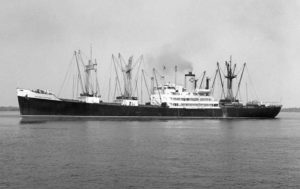 On a cold, windy afternoon in New York City on December 7, 1952, my mother and father joined ten other passengers on a cargo freighter bound for Africa. The ship, called the “African Lightning,” steamed for seven weeks across the Atlantic Ocean and around the Cape of Good Hope, passing near a hurricane on its way from Mozambique to the Kenyan coast.
On a cold, windy afternoon in New York City on December 7, 1952, my mother and father joined ten other passengers on a cargo freighter bound for Africa. The ship, called the “African Lightning,” steamed for seven weeks across the Atlantic Ocean and around the Cape of Good Hope, passing near a hurricane on its way from Mozambique to the Kenyan coast.
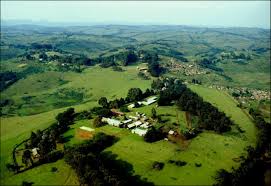 I stood with tears rolling down my cheeks. I was seven years old and was saying goodbye to my parents. They had just gotten me settled into boarding school at Rethy Academy in northern Congo and introduced me to my dorm parents. Rethy Academy was a missionary boarding school where about sixty children were enrolled in first through ninth grades. Dorm parents served as my surrogate mother and father for each three-month term of school.
I stood with tears rolling down my cheeks. I was seven years old and was saying goodbye to my parents. They had just gotten me settled into boarding school at Rethy Academy in northern Congo and introduced me to my dorm parents. Rethy Academy was a missionary boarding school where about sixty children were enrolled in first through ninth grades. Dorm parents served as my surrogate mother and father for each three-month term of school.
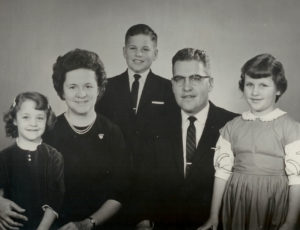 I remember seeing my parents and the other missionaries huddled around our large Zenith radio in the living room, staining to decipher the Voice of America and BBC news bulletins through the loud static that was an integral part of the shortwave broadcast. It soon became obvious that we had no choice but to evacuate from Congo for the third time.
I remember seeing my parents and the other missionaries huddled around our large Zenith radio in the living room, staining to decipher the Voice of America and BBC news bulletins through the loud static that was an integral part of the shortwave broadcast. It soon became obvious that we had no choice but to evacuate from Congo for the third time.
Our family lived off the generosity of others until we were able to get back on our feet. As a thirteen-year-old, I learned firsthand about caring for others who were in need and about serving those who were less fortunate than we were as friends gave us towels, sheets, dishes, and other items we needed to establish our new home. But little did I know what this new home would be like. We had been chased across the continent; at least we had each other.
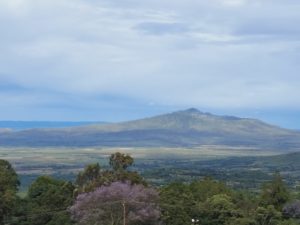 Kijabe is perched two-thirds of the way up the steep slopes that form the eastern side of the Great Rift Valley. Our house overlooked the beautiful Rift Valley plains and two extinct volcanoes—Suswa and Longonot. Shadows cast by popcorn-shaped clouds painted ever-changing patterns on the expansive valley floor. Our panoramic view of the Rift Valley remained the same, but the picture was always different. We never tired of living in Kijabe because of its magnificent location, spectacular scenery, and lush vegetation.
Kijabe is perched two-thirds of the way up the steep slopes that form the eastern side of the Great Rift Valley. Our house overlooked the beautiful Rift Valley plains and two extinct volcanoes—Suswa and Longonot. Shadows cast by popcorn-shaped clouds painted ever-changing patterns on the expansive valley floor. Our panoramic view of the Rift Valley remained the same, but the picture was always different. We never tired of living in Kijabe because of its magnificent location, spectacular scenery, and lush vegetation.
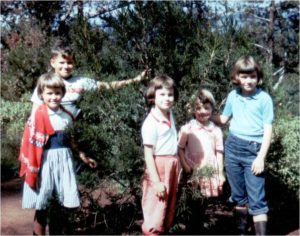 Kijabe is also where I became better acquainted with a young lady named Judy DeYoung. While I did not show it openly, I was infatuated with her. I did my best to sit next to Judy whenever our families had meals together and I enjoyed hiking with her when our two families had picnics on the floor of the Rift Valley below Kijabe. During those outings, we would spend time together sneaking up on zebra and chasing giraffe while we waited for the hamburgers to cook. As we got older, this was still great fun . . . but a bit frustrating as Judy treated me more like a brother than a boyfriend. (Picture is of Gration and DeYoung families cutting a Christmas tree in 1964.)
Kijabe is also where I became better acquainted with a young lady named Judy DeYoung. While I did not show it openly, I was infatuated with her. I did my best to sit next to Judy whenever our families had meals together and I enjoyed hiking with her when our two families had picnics on the floor of the Rift Valley below Kijabe. During those outings, we would spend time together sneaking up on zebra and chasing giraffe while we waited for the hamburgers to cook. As we got older, this was still great fun . . . but a bit frustrating as Judy treated me more like a brother than a boyfriend. (Picture is of Gration and DeYoung families cutting a Christmas tree in 1964.)
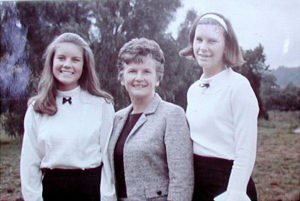
Judy’s mother died in a car accident in Kenya on June 8, 1972. Her body was laid to rest next to her husband’s grave in the Kijabe cemetery. She was in the prime of her life—just fifty-two years old. I will always remember her as a strong and courageous woman of God. It was incredibly brave of her to head out to Africa in the early 1950s. It was even braver for her to stay on as a single mother and to raise her daughters in Kenya. Judy and I both missed being able to share our deepening relationship with her mother, but my parents did their best to “adopt” Judy while, at the same time, serving as her legal guardians.
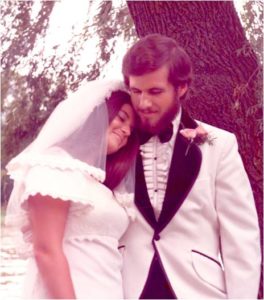 It was August 3, 1974. I remember standing in the front of the sanctuary with my best man and groomsman, anxiously looking down the aisle. When she filled the church with the first notes of Jeremiah Clarke’s “Trumpet Voluntary,” the congregation stood and swiveled toward the back, seeing what I saw; my beautiful bride on the red carpet, guided by my father’s arm. Smiles and tears greeted the pair as they slowly walked down the aisle in step with the majestic music my sister piped through the church’s magnificent organ.
It was August 3, 1974. I remember standing in the front of the sanctuary with my best man and groomsman, anxiously looking down the aisle. When she filled the church with the first notes of Jeremiah Clarke’s “Trumpet Voluntary,” the congregation stood and swiveled toward the back, seeing what I saw; my beautiful bride on the red carpet, guided by my father’s arm. Smiles and tears greeted the pair as they slowly walked down the aisle in step with the majestic music my sister piped through the church’s magnificent organ.
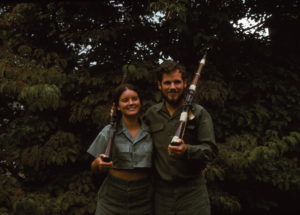
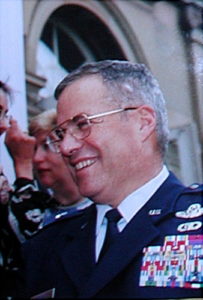 After a short honeymoon, we drove to Columbus Air Force Base in northern Mississippi for a year of undergraduate pilot training. I was excited to fly jets and start my career of military service. Little did we know that we would stay in the Air Force for 32 years, move 16 times, rear four children, and love the experience.
After a short honeymoon, we drove to Columbus Air Force Base in northern Mississippi for a year of undergraduate pilot training. I was excited to fly jets and start my career of military service. Little did we know that we would stay in the Air Force for 32 years, move 16 times, rear four children, and love the experience.